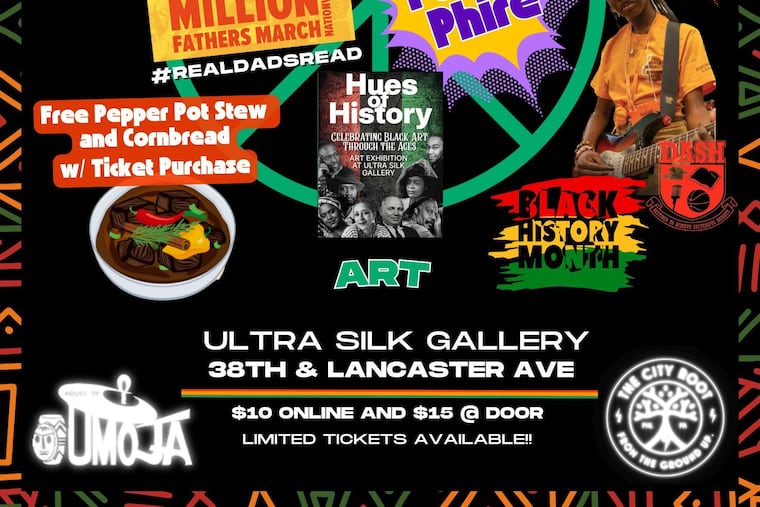Philly’s Queen Mother Falaka Fattah talks ‘Books vs Bullets’ and House of Umoja’s ‘Reading Is Resistance’ plan
The House of Umoja is launching 'Reading is Resistance' and urging fathers to read with their children at West Philly's Ultra Silk Gallery on Saturday. Here's a Q&A with founder Falaka Fattah.

In 1981, The Inquirer published an article with a headline that called Queen Mother Falaka Fattah, cofounder of the House of Umoja, “The Miracle Worker of North Frazier Street.”
That article told how Fattah, then known as Sister Falaka Fattah, had gained international acclaim for reducing gang violence in Philadelphia and that she saw herself as a Black Nationalist whose heroes included Marcus Garvey and Malcolm X.
Yet, there she was, invited to speak in Washington at a meeting convened by the American Enterprise Institute, “the leading source of conservative intellectual firepower in the United States.“ The topic of her discussion was “the role of grassroots institutions” in addressing public policy issues such as fighting crime.
Today, going on 43 years later, Queen Mother Fattah, now 92, is still prescribing antidotes to violence:
The House of Umoja has joined with the online publication the City Root to announce a new “Reading Is Resistance” initiative to promote the importance of reading to children and, especially, for Black fathers to read to their children. She said the idea of “Reading Is Resistance” is to combat the movement to ban books about Black history and other topics in schools and libraries.
Queen Mother Fattah, who is the subject of a new documentary, Queen Mother: Falaka Fattah & the House of Umoja by Philly filmmaker Jos Duncan, recently talked about the reading initiative and a panel discussion, “Books vs. Bullets: 1968 To Present,” to launch it. The event is set for 6 p.m. to 10 p.m. Saturday at Ultra Silk Gallery, 3808 Lancaster Ave.
There will also be food, music and the “Hues of History” art exhibit. Tickets are $10 in advance online; $15 at the door. Fattah said she is homebound and will not attend in person, “but I’ll be there in spirit.”
This conversation has been lightly edited and condensed for clarity.
How did you come up with the idea for “Reading Is Resistance”?
It really was a collaborative effort with others here at the House of Umoja and with the City Root. There had been so much in the news about how they are banning books in schools and libraries. The panel discussion we’re having Saturday, which I named “Books vs. Bullets,” is a way we, as a community, can resist this [book banning] effort by advocating for more education, and more reading.
The program is aimed at helping fathers get more involved in reading to their children. Why is that?
The House of Umoja was selected 17 years ago to be the Philadelphia chapter of the Million Fathers March, which encourages Black fathers to walk with their children to school on the first day of school. My husband David [Fattah], who has passed away, loved the project. Now my grandson [Anthony Bannister Fattah] has taken it on.
Now, instead of just walking their children on that first day of school, we’ve developed it into a year-round program, with fathers making sure they stay involved with their children’s education, knowing what their roster is, meeting with their teachers. We know that when fathers are involved with their children’s education and reading with them, that the violence goes down.
We are asking that all fathers, whether they are living in the home with their children or whether they are noncustodial fathers who may be divorced, never married, incarcerated, or in the armed services, read with their children. Even if they are not living with the child, if they make the time to read the same books that their children are reading and discuss it with them later, they can be very active in their children’s lives. This not only helps with the children’s educational progress, but it helps to build that family bond.
When we don’t know our history, we take on the value system of the oppressors instead of valuing ourselves. That’s where the violence comes from.
Where did you get the idea of “Books vs. Bullets”?
In 1968, I started a magazine called Umoja that came out of the Black Power Conference held at the Church of the Advocate. I started getting letters asking why so many of our teenagers were killing each other. I asked my husband, David, to investigate and he went out and found out that not only was there a serious gang war problem, but that my second-oldest son, Robin, who was 16, was a gang member. David and I decided to invite his gang to live with us, and we started talking with them and teaching them their history.
When we don’t know our history, we take on the value system of the oppressors instead of valuing ourselves. That’s where the violence comes from. We began teaching these gang members more about their history and reading books with them. When they read more, they became more proud of who they were. That’s why I called this discussion “Books vs Bullets,” because if you have our children reading, if they can imagine a future for themselves, they are less likely to get involved in violence.